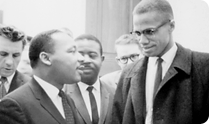Rethinking Martin
and Malcolm
Tuesday, February 22, 2011
7:00 p.m.–8:30 p.m. (EST)

Leader
Professor Emeritus of History
Rutgers University
National Humanities Center Fellow
About the Seminar
Martin Luther King, Jr., the apostle of non-violence, spoke of brotherhood and gave the civil rights movement of the 1960s its moral force.
Malcolm X, the proponent of “any means necessary,” spoke of ballots and bullets and displayed the movement’s anger and frustration.
Often teachers frame the civil rights movement between the seemingly stark polarities established by these two leaders. But how different were their positions? Did they share any common ground? How did they play off of each other’s positions and rhetoric to advance the cause of African Americans? How has recent scholarship rethought Martin and Malcolm? Where did the civil rights movement end and Black Power begin?

Enter Moodle Forum
Assigned Readings
To incorporate seminar texts into your teaching, we offer the National Humanities Center’s Primary Document Application Form.- “Pilgrimage to Nonviolence,” Martin Luther King, Jr., Stride Toward Freedom: The Montgomery Story. (PDF)
- Excerpts from The Autobiography of Malcolm X, Malcolm X, 1964. (PDF)
- “Letter from Birmingham City Jail”, Martin Luther King, Jr., 1963.
- “Letter to the Grass Roots”, Malcolm X, 1963. In George Breitman, ed., Malcolm X Speaks. (PDF)
- “On Black Nationalists and Malcolm X”, Martin Luther King, Jr., excerpt from interview with Alex Haley, 1965. Martin Luther King, Jr., Malcolm X, and the Civil Rights Struggle of the 1950s and 1960s: A Brief History with Documents. (PDF)
- “King is the White Man’s Best Weapon”, Malcolm X, 1963. Martin Luther King, Jr., Malcolm X, and the Civil Rights Struggle of the 1950s and 1960s: A Brief History with Documents. (PDF)
- “Give Us the Ballot,” Martin Luther King, Jr., 1957.
- “The Ballot or the Bullet,” Malcolm X, 1964.
- “Where Do We Go from Here?” Martin Luther King, Jr., 1967.
- “On Whites”, Malcolm X, excerpt from The Autobiography. (PDF)
- “I See the Promised Land,” Martin Luther King, Jr., 1968.
- “On the Prospects of Death”, Malcolm X, excerpt from The Autobiography. (PDF)
Presentation
PowerPoint: 262 KBOnline Evaluation
Seminar Recording
Download Recording (You will need to install the WebEx ARF player, available at download, to play back the recording.)
